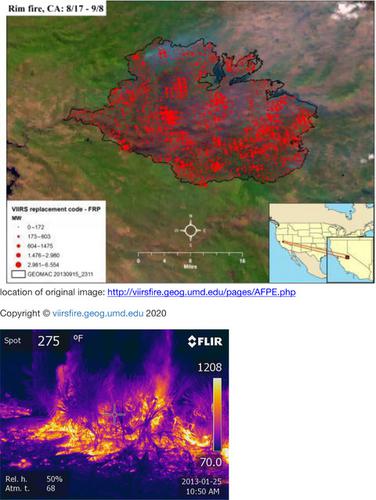Our official English website, www.x-mol.net, welcomes your feedback! (Note: you will need to create a separate account there.)
Fire as a fundamental ecological process: Research advances and frontiers
Journal of Ecology ( IF 5.5 ) Pub Date : 2020-04-18 , DOI: 10.1111/1365-2745.13403 Kendra K. McLauchlan 1 , Philip E. Higuera 2 , Jessica Miesel 3 , Brendan M. Rogers 4 , Jennifer Schweitzer 5 , Jacquelyn K. Shuman 6 , Alan J. Tepley 2 , J. Morgan Varner 7 , Thomas T. Veblen 8 , Solny A. Adalsteinsson 9 , Jennifer K. Balch 8 , Patrick Baker 10 , Enric Batllori 11 , Erica Bigio 12 , Paulo Brando 13 , Megan Cattau 14 , Melissa L. Chipman 15 , Janice Coen 6 , Raelene Crandall 16 , Lori Daniels 17 , Neal Enright 18 , Wendy S. Gross 19 , Brian J. Harvey 20 , Jeff A. Hatten 21 , Sharon Hermann 22 , Rebecca E. Hewitt 23 , Leda N. Kobziar 24 , Jennifer B. Landesmann 25 , Michael M. Loranty 26 , S. Yoshi Maezumi 27 , Linda Mearns 6 , Max Moritz 28 , Jonathan A. Myers 9 , Juli G. Pausas 29 , Adam F. A. Pellegrini 30 , William J. Platt 31 , Jennifer Roozeboom 1 , Hugh Safford 32 , Fernanda Santos 33 , Robert M. Scheller 34 , Rosemary L. Sherriff 35 , Kevin G. Smith 36 , Melinda D. Smith 37 , Adam C. Watts 38
中文翻译:

火是基本的生态过程:研究进展和前沿
更新日期:2020-04-18
Journal of Ecology ( IF 5.5 ) Pub Date : 2020-04-18 , DOI: 10.1111/1365-2745.13403 Kendra K. McLauchlan 1 , Philip E. Higuera 2 , Jessica Miesel 3 , Brendan M. Rogers 4 , Jennifer Schweitzer 5 , Jacquelyn K. Shuman 6 , Alan J. Tepley 2 , J. Morgan Varner 7 , Thomas T. Veblen 8 , Solny A. Adalsteinsson 9 , Jennifer K. Balch 8 , Patrick Baker 10 , Enric Batllori 11 , Erica Bigio 12 , Paulo Brando 13 , Megan Cattau 14 , Melissa L. Chipman 15 , Janice Coen 6 , Raelene Crandall 16 , Lori Daniels 17 , Neal Enright 18 , Wendy S. Gross 19 , Brian J. Harvey 20 , Jeff A. Hatten 21 , Sharon Hermann 22 , Rebecca E. Hewitt 23 , Leda N. Kobziar 24 , Jennifer B. Landesmann 25 , Michael M. Loranty 26 , S. Yoshi Maezumi 27 , Linda Mearns 6 , Max Moritz 28 , Jonathan A. Myers 9 , Juli G. Pausas 29 , Adam F. A. Pellegrini 30 , William J. Platt 31 , Jennifer Roozeboom 1 , Hugh Safford 32 , Fernanda Santos 33 , Robert M. Scheller 34 , Rosemary L. Sherriff 35 , Kevin G. Smith 36 , Melinda D. Smith 37 , Adam C. Watts 38
Affiliation

|
- Fire is a powerful ecological and evolutionary force that regulates organismal traits, population sizes, species interactions, community composition, carbon and nutrient cycling and ecosystem function. It also presents a rapidly growing societal challenge, due to both increasingly destructive wildfires and fire exclusion in fire‐dependent ecosystems. As an ecological process, fire integrates complex feedbacks among biological, social and geophysical processes, requiring coordination across several fields and scales of study.
- Here, we describe the diversity of ways in which fire operates as a fundamental ecological and evolutionary process on Earth. We explore research priorities in six categories of fire ecology: (a) characteristics of fire regimes, (b) changing fire regimes, (c) fire effects on above‐ground ecology, (d) fire effects on below‐ground ecology, (e) fire behaviour and (f) fire ecology modelling.
- We identify three emergent themes: the need to study fire across temporal scales, to assess the mechanisms underlying a variety of ecological feedbacks involving fire and to improve representation of fire in a range of modelling contexts.
- Synthesis: As fire regimes and our relationships with fire continue to change, prioritizing these research areas will facilitate understanding of the ecological causes and consequences of future fires and rethinking fire management alternatives.
中文翻译:

火是基本的生态过程:研究进展和前沿
- 火是一种强大的生态和进化力量,可调节生物特征,种群数量,物种相互作用,群落组成,碳和养分循环以及生态系统功能。由于越来越多的破坏性野火和依赖火的生态系统中的火被排除,它也带来了迅速增长的社会挑战。作为一种生态过程,火灾将生物,社会和地球物理过程之间的复杂反馈整合在一起,需要跨多个领域和研究规模进行协调。
- 在这里,我们描述了火作为地球上基本的生态和进化过程的运作方式的多样性。我们探讨了六种火灾生态学的研究重点:(a)火灾状况的特征,(b)火灾状况的变化,(c)火灾对地上生态的影响,(d)火灾对地下生态的影响,(e )火灾行为和(f)火灾生态模型。
- 我们确定了三个新出现的主题:需要研究跨时间尺度的火灾,评估涉及火灾的各种生态反馈的机制以及在一系列建模环境中改进火灾的表示。
- 综述:随着着火状况和我们与火的关系不断变化,优先考虑这些研究领域将有助于人们了解未来火的生态原因和后果,并重新思考火管理的替代方案。



























 京公网安备 11010802027423号
京公网安备 11010802027423号